
Tibetan Buddhism is a form of Buddhism practiced in Tibet and Mongolia. It also has a sizable number of adherents in the areas surrounding the Himalayas, including the Indian regions of Ladakh, Sikkim, and Arunachal Pradesh, as well as Bhutan and Nepal. Smaller groups of practitioners can be found in Central Asia, Xinjiang, Inner Mongolia, and some regions of Russia, such as Tuva, Buryatia, and Kalmykia.
The Bodhisattvacaryāvatāra or Bodhicaryāvatāra translated into English as A Guide to the Bodhisattva's Way of Life, is a Mahāyāna Buddhist text written c. 700 AD in Sanskrit verse by Shantideva (Śāntideva), a Buddhist monk at Nālandā Monastic University in India which is also where it was composed.

The Gelug is the newest of the four major schools of Tibetan Buddhism. It was founded by Je Tsongkhapa (1357–1419), a Tibetan philosopher, tantric yogi and lama and further expanded and developed by his disciples.
Lamrim is a Tibetan Buddhist textual form for presenting the stages in the complete path to enlightenment as taught by Buddha. In Tibetan Buddhist history there have been many different versions of lamrim, presented by different teachers of the Nyingma, Kagyu and Gelug schools. However, all versions of the lamrim are elaborations of Atiśa's 11th-century root text A Lamp for the Path to Enlightenment (Bodhipathapradīpa).

Thrangu Rinpoche was born in Kham, Tibet. He was deemed to be a prominent tulku in the Kagyu school of Tibetan Buddhism, the ninth reincarnation in his particular line. His full name and title was the Very Venerable Ninth Khenchen Thrangu Tulku, Karma Lodrö Lungrik Maway Senge. The academic title Khenchen denotes great scholarly accomplishment, and the term Rinpoche is a Tibetan devotional title which may be accorded to respected teachers and exemplars.

The New Kadampa Tradition – International Kadampa Buddhist Union (NKT—IKBU) is a global Buddhist new religious movement founded by Kelsang Gyatso in England in 1991. In 2003 the words "International Kadampa Buddhist Union" (IKBU) were added to the original name "New Kadampa Tradition". The NKT-IKBU is an international organisation registered in England as a charitable, or non-profit, company. It currently lists more than 200 centres and around 900 branch classes/study groups in 40 countries. The BBC describe the New Kadampa Tradition as "one of the major Buddhist schools in the UK, founded by the Tibetan-born Geshe Kelsang Gyatso."

Thubten Yeshe (1935–1984) was a Tibetan lama who, while exiled in Nepal, co-founded Kopan Monastery (1969) and the Foundation for the Preservation of the Mahayana Tradition (1975). He followed the Gelug tradition, and was considered unconventional in his teaching style.
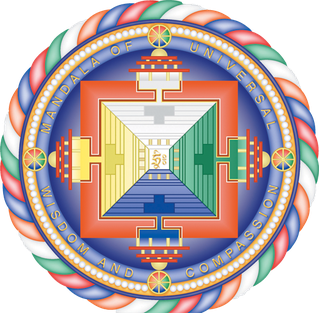
The Foundation for the Preservation of the Mahayana Tradition (FPMT) was founded in 1975 by Lamas Thubten Yeshe and Thubten Zopa Rinpoche, who began teaching Mahayana Buddhism to Western students in Nepal. The FPMT has grown to encompass over 160 dharma centers, projects, and services in 37 countries. After the 1984 death of Lama Yeshe, the FPMT's spiritual director was Lama Zopa, who died in 2023. No successor has been named; meetings on the organization's structure and future are planned.
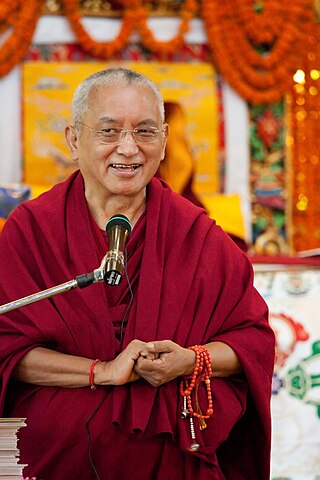
Thubten Zopa Rinpoche was a Tibetan Buddhist lama in the Gelug school. He is known for founding the Foundation for the Preservation of the Mahayana Tradition and Maitripa College in Portland, Oregon.
The Pratimokṣa is a list of rules governing the behaviour of Buddhist monastics. Prati means "towards" and mokṣa means "liberation" from cyclic existence (saṃsāra).
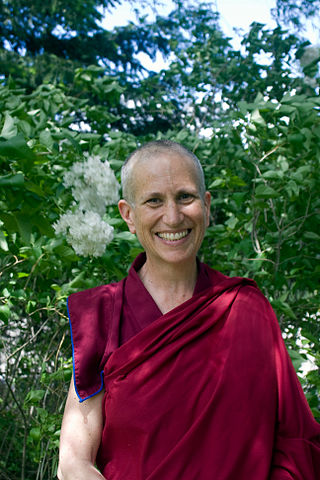
Thubten Chodron, born Cheryl Greene, is an American Tibetan Buddhist nun, author, teacher, and the founder and abbess of Sravasti Abbey, the only Tibetan Buddhist training monastery for Western nuns and monks in the United States. Chodron is a central figure in the reinstatement of the Bhikshuni ordination of women. She is a student of the 14th Dalai Lama, Tsenzhab Serkong Rinpoche, Lama Thubten Yeshe, Thubten Zopa Rinpoche, and other Tibetan masters. She has published many books on Buddhist philosophy and meditation, and is co-authoring with the Dalai Lama a multi-volume series of teachings on the Buddhist path, The Library of Wisdom and Compassion.

Women in Buddhism is a topic that can be approached from varied perspectives including those of theology, history, anthropology, and feminism. Topical interests include the theological status of women, the treatment of women in Buddhist societies at home and in public, the history of women in Buddhism, and a comparison of the experiences of women across different forms of Buddhism. As in other religions, the experiences of Buddhist women have varied considerably.
Thubten Gyatso is an Australian monk and was ordained by Lama Thubten Yeshe in the 1970s and was one of the first Westerners to become a monk in the Gelug school of Tibetan Buddhism. He is a Foundation for the Preservation of the Mahayana Tradition veteran who has been instrumental in establishing a number of Dharma centres in France, Taiwan, Australia, and Mongolia.
Nicholas Ribush was one of the first Westerners to be ordained as a monk in the Tibetan Buddhist tradition. A founder of Wisdom Publications, Ribush is today the director of the Lama Yeshe Wisdom Archive, a collection of thousands of teachings by Lama Yeshe and Lama Zopa Rinpoche, who pioneered the teaching of Tibetan Buddhism in the West.
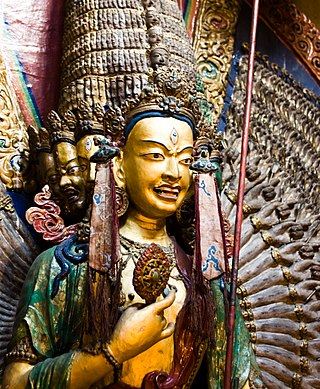
Sitātapatra is a protector against supernatural danger in Buddhism. She is venerated in both the Mahayana and Vajrayana traditions. She is also known as Usnisasitatapatra or Uṣṇīṣa Sitātapatra. It is believed that Sitātapatra is a powerful independent deity emanated by Gautama Buddha from his Uṣṇīṣa. Whoever practices her mantra will be reborn in Amitābha's pure land of Sukhāvatī as well as gaining protection against supernatural danger and witchcraft.
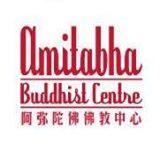
Amitabha Buddhist Centre is a Buddhist institution in Geylang, Singapore. It is affiliated with the Foundation for the Preservation of the Mahayana Tradition (FPMT), an international non-profit organisation, founded by Lama Thubten Yeshe.
Thekchen Choling is a registered Buddhist organisation in the Republic of Singapore. The organisation was started in 2001 by Singha Thekchen Rinpoche and a group of his initial disciples. The organisation promotes non-sectarian Buddhism, emphasizing understanding of Theravada and Mahayana teachings. TCCL is committed to the Rime (non-sectarian) movement within Tibetan Buddhism though it is of the Gelug tradition. The primary practices and teachings of this temple are from Guru Rinpoche lineage and Lama Tsongkapa lineage.
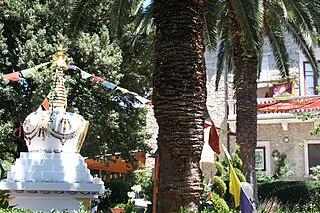
The Istituto Lama Tzong Khapa (ILTK) in Pomaia, a village in Tuscany, in Italy (40 km south of Pisa) is a branch of the Foundation for the Preservation of the Mahayana Tradition (FPMT), an international network of Gelugpa dharma centers. It is named for Tsongkhapa, founder of the Gelugpa monastic order of Tibetan Buddhism. The Dalai Lama has taught there on several occasions.

Freda Bedi, also known as Sister Palmo or Gelongma Karma Kechog Palmo, was a British woman who was jailed in India as a supporter of Indian nationalism and was the first Western woman to take full ordination in Tibetan Buddhism.














